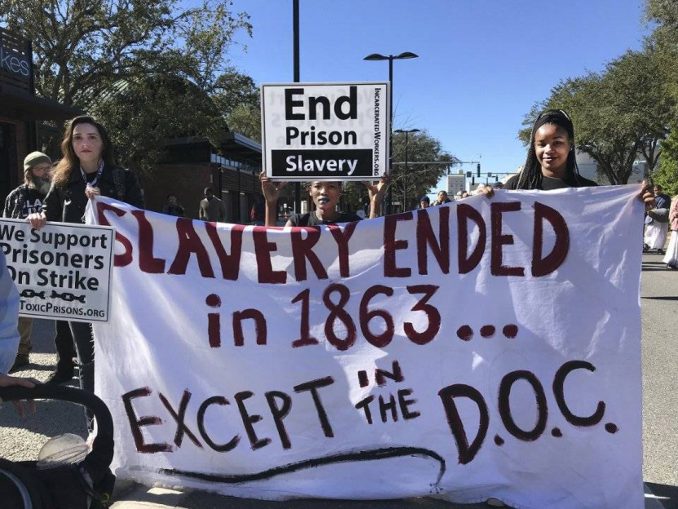Florida prisoners launch strike against slave labor
Lake Butler Work Camp, Fla., Jan. 16 — There is one place in the U.S. where slavery is still constitutionally legal: in prisons. The 13th Amendment to the U.S. Constitution, passed in 1864, abolished slavery and involuntary servitude, except as punishment for a crime.
But prisoners held in this enslavement are organizing resistance. Brave prisoners within the Florida state prison system have organized themselves into a month-long work strike called Operation Push. It began on Jan. 15, Martin Luther King Day. In a phone interview, an anonymous prisoner-activist specifically linked the strike to King’s legacy of protest against racism and economic injustice. (tinyurl.com/yafoh75p)
The following call is an excerpt from the full call to action, initially posted online via SPARC (Supporting Prisoners and Real Change):
“We are currently forming a network agency within [Florida] Department of Corrections. We are asking all prisoners within the DOC to take a stand by “laying down” starting Jan. 15, 2018, until the injustice we see facing prisoners within the Florida system is resolved. We are calling on all organized groups, as well as religious systems, to come together on the same page. We will be taking a stand for:
- Payment for our labor, rather than our current slave arrangement
- Ending outrageous canteen prices
- Reintroducing parole incentives to lifers and those with ‘Buck Rogers’ dates.
“Along with these primary demands, we are also expressing our support for the following goals: 1) Stop the overcrowding and acts of brutality committed by officers through the FDOC. 2) Expose the environmental conditions we face including extreme temperatures, mold, contaminated water, and being placed next to toxic sites. 3) Honor the moratorium on state executions. 4) Restore voting rights as a basic human right to all.”
On Jan. 15 demonstrations in support of the Florida prisoners’ strike took place across the state and country. The strike actions have been endorsed by over 100 organizations.
This writer attended the demonstration at Lake Butler RMC Florida (Receiving and Medical Center) Work Camp, where over 50 people marched up and down the road in front of the prison, voicing support for the striking prisoners.
Prisoners were visible, and could see and hear as people chanted “You are not forgotten, you are not alone, we will fight to bring you home,” “End prison slavery,” and “Brick by brick, wall by wall, we will see the DOC fall.”
Members of prisoners’ families and of support groups spoke in solidarity with the strike. One mother told how her son was falsely convicted at age 14 and sentenced to 58 years in prison; he was sent to an adult prison at age 16. She has had to fight to get medical care for him, with existing care practically nonexistent and prisoners taken ill with life-threatening conditions.
As this article goes to press, a demonstration is taking place in Tallahassee at the Florida Department of Corrections headquarters. DOC has locked its doors and will not provide any statements to the demonstrators regarding the demands of the prisoners or their current conditions.
Karen Smith of the Incarcerated Workers Organizing Committee, who helped coordinate the Tallahassee action at the prison and support on the outside, told WW that there is difficulty now receiving information from the prisoners inside. Smith said: “A lot of the leaders were put in solitary confinement last week. All communication regarding the strike from prisoners ended Sunday night [Jan. 14]. I received a text yesterday stating the prisoners are on strict lockdown and more people are being put into solitary.”
This brave struggle being waged by the most oppressed should serve as a beacon to all people who are fighting the racist, capitalist U.S. system, which was built on the backs of enslaved African people and on land stolen from Indigenous people.
The strike inside will only be as successful as the movement we build on the outside to support the prisoners and spread their message to end prison slavery. To become active and find ways to participate, contact fighttoxicprisons.org.


